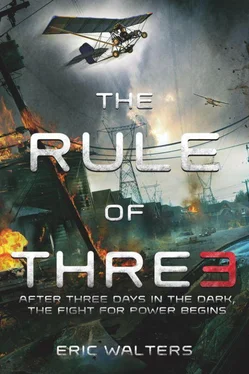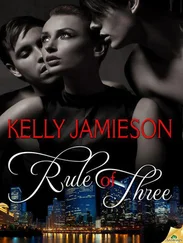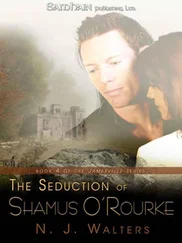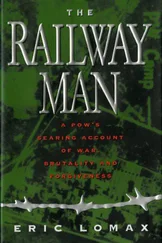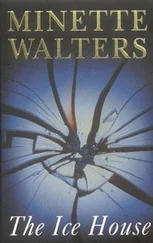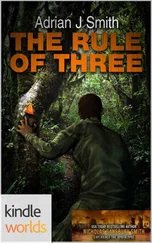“It’s okay,” my mother said. “We’ve all been under a lot of pressure.”
“I’d be grateful if you didn’t mention any of this plan to anybody else. It will only upset people… the way it upset you two.”
“It will stay right here,” my mother said.
“Thank you. I think I need to get some sleep.”
Slowly he limped away, and out the door, leaving us alone.
“I know he’s just trying to do the best for all of us,” my mother said. “It has been a tremendous strain.”
It had. That didn’t mean he was wrong. He just didn’t want us to think about it anymore or, worse still, tell anybody.
I had to clear my head. “I think I need to go for a walk.”
“That would be nice. I wish I could go with you, but I need to get some sleep, too.”
She stood and rested her hand on my head for a moment before leaving the kitchen. I stayed in my chair.
Maybe we’d never need to do what Herb was suggesting. Maybe we would. He was old, but nobody’s fool. I couldn’t help feeling he’d just put another chess move together with us watching, not even knowing there was a game being played.
It was early but not completely quiet in the neighborhood. I stepped out the front door, locking it behind me. People were already up and out, a lot of them carrying water containers, heading down to the creek. I remembered how low the water was when I went with Rachel and Danny before. What would happen if it didn’t rain for a while or when winter came and the water was trapped as snow? Would there be water for us then? It was scary that I was even thinking that far in advance—winter was seven months away.
Of course, the Petersons didn’t have to worry about water. Their well had enough water to provide for the whole farm and, if Herb had his way, for the people who would live there. One hundred and fifty people needed a lot less water than sixteen hundred. Hopefully, the well would be enough. Herb probably had the whole thing figured out when he was there, looking, talking to Mr. Peterson, and planning and plotting.
Plotting—that’s what it felt like. I felt a surge of anger. Herb was plotting all of this behind the scenes. He was willing to sacrifice all of those people to make this work for us—for him. Would he be willing to sacrifice my family if he had to? Really, there was no doubt that he would. But then again, I’d sacrifice him if I had to for my mother or sister or brother, or my father. What about my father? If we were gone from here and he came back, how would he find us? He wouldn’t know to go to the Petersons’ farm.
I kept walking, nodding and waving to people but trying my best to keep to myself. Despite everything there was a certain civility in the way we were all treating one another. I’d actually gotten to know some of my neighbors better in the last six days than I had in the twelve years that went before. That only made it worse because now I was starting to know more and more of them as people, not just a face driving by. If Herb was right, if we did have to leave them behind, they’d be left without a leader, or a plan, or anybody to defend and protect them. It wasn’t a question of how many were going to die, but how many would actually be able to survive.
This all reminded me of Todd talking about our situation being like a zombie movie. All around me, I was strolling through the walking dead. If it got worse, if we had to abandon the neighborhood, then most of these people were going to die and they didn’t know it. I strained my mind trying to connect the real people to the names on the list.
I got to the end of my street and continued up Folkway, past houses, past streets, past abandoned cars that had been pushed from the middle of the road and parked off to the side. The lawns were still green and were still being tended. Gas lawn mowers still worked, and despite everything people were still cutting their grass. It was a strange little ritual, an attempt to stay normal in a world that was no longer normal. Flowers were starting to bloom after the warm April weather. Many gardens had been planted prior to all this happening, and the flowers didn’t know there was anything wrong. They had soil and sun and enough rainfall to keep growing. Strange how the people who had planted them were in jeopardy, but the plants would continue to thrive. If only people had known what was coming they could have put in vegetables instead of flowers.
I came to the mini-mall. The stores were all closed. If it hadn’t been for the boarded-up windows on the grocery store everything else would have seemed completely normal. I walked along, passing the stores, looking in the windows, thinking.
First was Baskin-Robbins, where I used to meet my friends for an ice cream or, when we were little, go with our parents after a soccer game. There would be a line right out the door, parents and kids in their uniforms and cleats, waiting and talking. For most of us it didn’t matter how the game ended as long as it ended with ice cream.
Then there was my dentist’s office, followed by the walk-in medical clinic and the pharmacy, and the veterinarian’s office that had just opened. There in four spaces were all the medical needs of man and beast.
Next were the variety store, the bakery, the pizza place, the dry cleaners, and finally the grocery store. I pressed my face against a remaining window. It was hard to see far into the store in the gloom, but the shelves still looked pretty full. There was a lot of food in there, but how much? It looked like it could keep all of us supplied for a few months, but what about six months or a year? I was sure Herb had done all the calculations correctly.
I wondered if part of his plan for leaving the neighborhood was that he was going to take the remaining food off the shelves when we left. Would it be done in the dead of night? Would the remaining people figure out what was happening and try to stop it? Would our guns be turned on our neighbors? Even then, would it be better to die quickly with a bullet or slowly from starvation or disease or attacks by outside gangs? I turned away. I didn’t want to think about what could be. Herb wasn’t the only one who wished I hadn’t figured it out.
I came toward the checkpoint. I recognized a couple of the men there, and we waved at each other. Sidestepping the checkpoint, I walked along the sidewalk down Erin Mills Parkway. Except for the abandoned cars, it hadn’t changed. The pavement, the multiple lanes separated north from south by a concrete divider and a grassy median, holding light posts that no longer worked.
When I was a kid this always marked the western boundary of my world. This street was too big and busy and dangerous for me to ever think about crossing. In fact, then I hardly ever left our neighborhood. I had the stores at the mini-mall, my school, the soccer field and basketball court, the field with the big electrical towers where people ran their dogs, my friends, the playground, and the people who lived here. It wasn’t big, but it had been my world—the highway to the north, Erin Mills Parkway to the west, Burnham to the south, and Mullet Creek and Mississauga Road to the east. Funny how those were the boundaries we were guarding. And now Herb was saying we had to abandon it to create a new world in order for us to survive.
I went to step out onto the road and stopped. There was no traffic, but there was still danger. Out there, beyond this boundary that we’d drawn, there were things that could still hurt me. I suddenly wished I’d taken my gun with me. My routine had always been cell phone, wallet, and keys. Now I didn’t need the cell phone or the wallet, but I did need a gun.
Herb’s words kept running through my head: “decisions have to be made”; “you can’t save everybody in the world”; “desperate and ruthless times call for desperate and ruthless actions.” I knew we couldn’t save the world, but maybe we could save everybody in my world. Then it came to me.
Читать дальше
